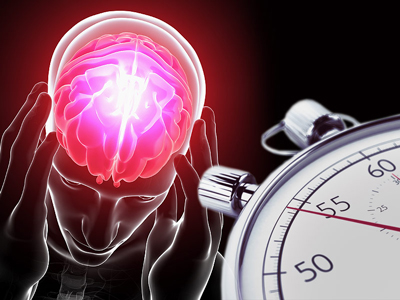Know Stroke
STROKE IS A MEDICAL EMERGENCY. EVERY MINUTE COUNTS WHEN SOMEONE IS HAVING A STROKE. It is important for everyone to know the signs and symptoms of a stroke and how to ACT FAST!

What is Stroke?
- 'Stroke' is a condition resulting from the blockage (ischemic stroke) or bursting (hemorrhagic stroke) of nutrient/oxygen carrying blood vessels to the brain.
- As the brain tissue continues to be deprived of oxygen, neurons (brain cells) begin to die.
- 1.9 Million neurons die every minute the brain is deprived of blood flow.
- As neurons die patients experience loss of function/malfunction of that region of the brain. Remember FAST to ACT FAST.
- About 1/4 of patients do experience a warning called a Transient Ischemic Attack (a TIA or a mini-stroke). A TIA does not leave permanent damage, but warns of an impending more serious stroke. It is therefore important that TIAs are treated urgently to prevent future strokes.
Identifying the Cause
Stroke treatment and prevention is based upon finding the reason for disrupted blood flow.
The most common first test is a CT scan to identify the type of stroke (ischemic or hemorrhagic), followed by a CT angiogram to look for areas of blockage or potential weakness in the blood vessels of the brain, and the blood vessels in the neck that lead to the brain. Blocked or weakened arteries may require urgent treatment. Other tests such as an MRI, heart monitoring, echocardiogram (ultrasound of the heart) and special blood tests may be done to look for further causes of stroke and to determine what urgent and/or long-term treatments are best for patients.
Remember FAST to ACT FAST
 |
Face is Asymmetric |
 |
Arm is Weak |
 |
Speech is Slurred |
 |
Time to call 911 |
Symptoms of Stroke
Symptoms of stroke may also include:
- Asymmetry of the face
- Weakness or Numbness of one side of body
- Unsteady gait
- Trouble speaking
- Trouble understanding speech
- Headache
- Loss of balance or coordination
- Confusion or disorientation
- Problems with vision
If you or anyone around you, experiences any of the above symptoms, you must call 911 immediately.
To Learn More About Stroke
You can also visit the links below: